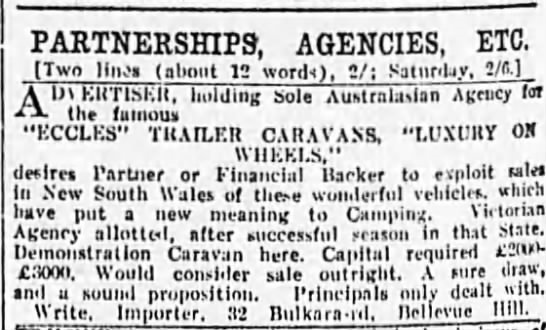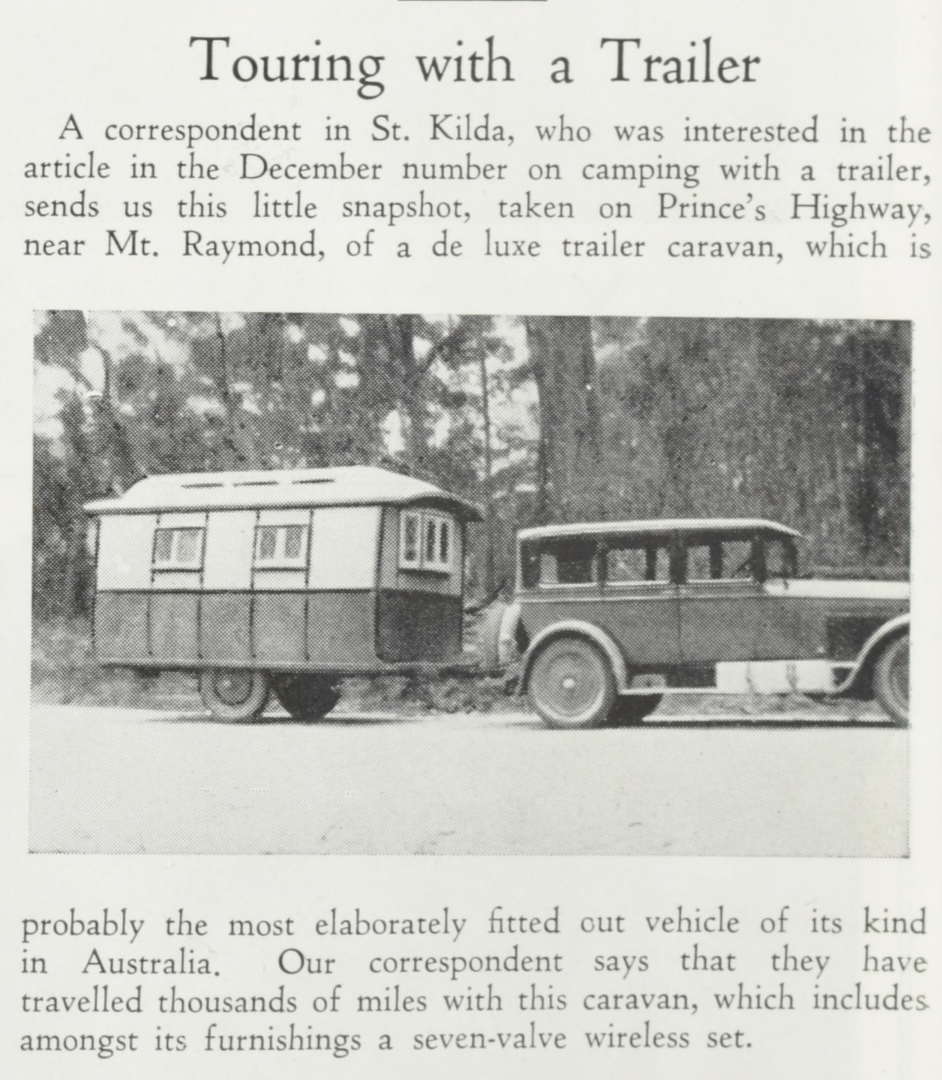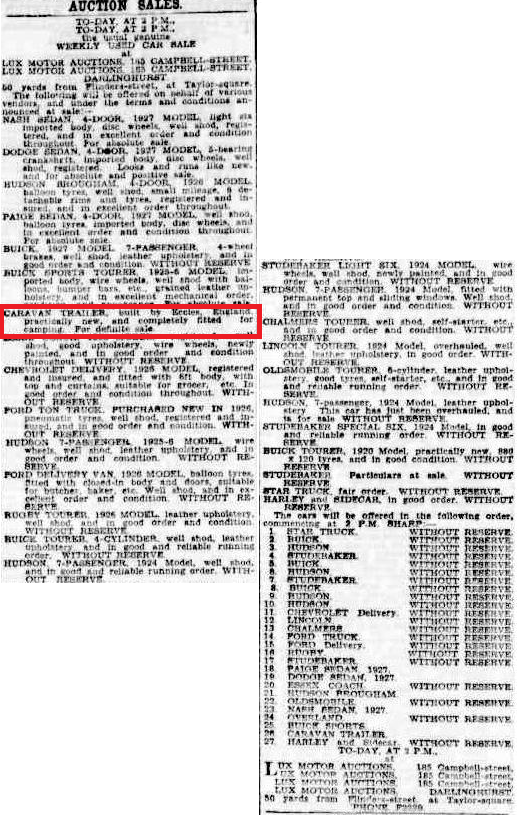Hi all,
Following the post commencing this thread, Andrew Woodmansey (
Woody99) and I have had further discussions about caravans imported into Australia, and in particular about Eccles caravans.
The Eccles Motor Transport Ltd, based in Birmingham, England, is credited by the UK caravan historian Andrew Jenkinson as being the 'true pioneer of caravan manufacture' in the UK. The Riley father and son who owned the company, along with a number of other people, had built 'motor caravans' (motor homes) from as early as 1913, and some others had also experimented with 'trailer caravans' (regular caravans) in the 1910's. However, in 1919 Eccles produced two trailer caravans which became the turning point for Eccles and the Rileys. In the 1920's, Eccles became a significant producer of quite a wide range of motor caravans and trailer caravans in the UK, and a very well known name in the fledgling industry. (Source: A Jenkinson,
Caravans: The Illustrated History - 1919-1959, pages 18-21)
So why rehearse this little bit of the history of a UK caravan manufacturer? The answer is that investigation has shown that Eccles also had some influence and presence in Australia in the 1920's and very early 30's.
As early as 1924, Australian newspapers were reporting very positively about the development of Eccles caravans in the UK. An example is this article published in the Brisbane
Daily Mail on Sunday, 7 September 1924 (page 13) which reported on the Eccles trailer caravans being hired out in England:
Note the comment at the end of the article:
"This [development] seems to provide a splendid example for some enterprising Queenslander. We have the advantage of perpetual holiday weather."
Another article extolling the virtues of the English Eccles caravans - this time a motor caravan - was printed in the Victorian
Countryman a few weeks later on Friday, 26 September 1924 (page 9):
_Fri_26Sept1924_p9_article223723812.png?width=1920&height=1080&fit=bounds)
Newspapers also printed photos of Eccles caravans in their pages. This photo of an Eccles trailer caravan in England (not a motor caravan as per the caption) was published in the motoring section of the Sydney Sun on Sunday, 19 July 1925 (page 8):
However, at least as early as 1926 Eccles caravans had begun to appear in Australia. This article printed in the Sydney Daily Telegraph on Saturday, 25 September 1926 (page 18) reported on an Eccles motor caravan that had been brought to Australia - probably as a private import - by Mr Hunter Crawford for a hunting and fishing expedition (as one does!). The motor caravan was built on a (Scottish) Albion coach chassis:
_Sat_25Sept1926_p18_article246347993.png?width=1920&height=1080&fit=bounds)
Layout modified for readability purposes.)
The text reads:
"A "COMFY" CARAVAN
"On Albion Coach Chassis
"FOR HUNTING AND FISHING
"Modern caravans usually take the form of trailers for touring cars, but the suitability of a commercial chassis for this type of vehicle is well shown by a recent production of the Eccles Motor Transport, Ltd., of Birmingham, on an Albion "Viking" passenger chassis. The vehicle is being used by Mr. Hunter Crawford on a hunting and fishing expedition in Australia. To ensure an even temperature inside, despite the extremes of climate which will be encountered, the body is built of aluminium armored wood, lined inside with polished oak; good ventilation is given by windows which slide in felt channels and the design of the clerestory roof.
The caravan can be entered through the driver's seat or at the back, and the interior of the body is divided into three parts. The first simply consists of the driver's compartment, the seat of which is made to form a bed, and lockers accommodate the driver's personal belongings. The centre compartment is the living room, which contains a large and luxurious settee, that can be unfolded to make a double bed, bed clothes being stored below the seat in the daytime. This compartment is also fitted with a wardrobe with a bevelled plate mirror, chest of drawers, lavatory basin, and various lockers for the storage of clothes, etc. The back portion is the kitchen; it is fitted with a paraffin cooker, the cupboard containing cooking and table utensils held firmly so as to be free from all rattle. A refrigerating plant and sink are also included.
A special locker which runs the full length of the roof, and is opened from the outside, accommodates fishing rods in one piece. Electric roof lights inside are worked from the vehicle batteries, and every precaution is taken to ensure comfort on long expeditions. Petrol, water, and oil are carried in running board lockers.
The New South Wales agent for Albion trucks and bus chassis is ??."
One amusing aspect of the article is that the journalist obviously meant to find out who was the Albion agent in NSW but neglected to do so, and the article went to print with just "??" in place of that information (see last line)!
On 13 July 1929,
The Graphic (a British weekly illustrated newspaper) published (page 108) the following fine photo of an Eccles trailer caravan on tour in New South Wales:
.png?width=1920&height=1080&fit=bounds)
(Source: Andrew Woodmansey)
Given the July 1929 publishing date of
The Graphic, it is tempting to connect the above photo with the following report published in the Melbourne
Argus on Tuesday, 6 November 1928 (page 13) on a caravan holiday along the New South Wales coast being undertaken by Mr & Mrs W Fullerton of St Kilda (Victoria). The article doesn't mention Eccles as such, and the photo of what looks to be an Eccles caravan accompanying the article may have been an English stock photo. Nevertheless the article does refer to English caravans, and there could easily have been a six or seven month gap between a contemporaneous report in the local
Argus newspaper and the later publication of a photo in an English weekly paper.
_Tues_6Nov1928_p13_article3967499_A1.png?width=1920&height=1080&fit=bounds)
_Tues_6Nov1928_p13_article3967499_A2.png?width=1920&height=1080&fit=bounds)
Layout modified for readability purposes.)
In any case, we know that Eccles trailer caravans had been imported to Australia in the second half of the 1920's and were being sold on the used caravan market. For example this advert sandwiched between a couple of motorcycle adverts in the
Argus on Thursday, 24 January 1929 (page 2) offered a 'Motor camper' and enticed potential buyers with the words
'Be safe, comfortable, dry, attach Light Eccles Trailer Caravan to your car':
_Thurs_24Jan1929_p2_article3983882.png?width=1920&height=1080&fit=bounds)
The seller followed up this with another advert in the Argus on Wednesday, 30 January 1929 (page 3) that revealed that the Eccles trailer had 'just returned [from an] Australian tour, perfect, cost £250, sell £195':
Similarly an Eccles trailer caravan was offered for sale at an auction in Sydney later that year, as listed in an advert for an auction house in the Sydney Morning Herald on Tuesday, 20 August 1929 (page 3):
Highlighting added; layout modified for readability.)
There are also many more adverts in the press which offered 'English caravans' for sale in the 1920's but didn't refer to Eccles or name a manufacturer. All the same, at least some of these are likely to have been Eccles caravans, although some may also have been built by other British manufacturers and then imported to Australia.
From the available evidence it seems as if most of the Eccles caravans seen in Australia in the 1920's and early 1930's had been privately imported. However, the following advert printed in the Sydney Morning Herald on Friday, 3 May 1929 (page 18) reveals that an unknown person saw the potential in importing Eccles caravans to Australia on a commercial basis. The advert states that the advertiser held the 'Sole Australasian Agency' for Eccles and was looking for a partner to represent Eccles in New South Wales. A Victorian agent (perhaps the advertiser?) had already been appointed:

At this point we do not know if a New South Wales agent was ever appointed, or whether the Eccles agency in Australasia (incorporating New Zealand?) ever really got off the ground. Certainly there are no adverts in the press offering Eccles caravans for sale on a commercial basis from the date of the advert onwards, however there are a few 1930 adverts for 'Eccles Dempsey Motors Ltd' in Paddington, NSW. None of the Eccles Dempsey adverts mention caravans, but it does raise the question of whether this company might possibly have been established as an Eccles caravan agency?
Nevertheless, it is evident that Eccles caravans were present in Australia almost a decade before the commercial manufacture of full-size/height caravans commenced in Australia.
Thanks to Andrew Woodmansey for his collaboration in exploring this topic.
Don Ricardo




(1).png?width=1920&height=1080&fit=bounds)
_Sun_7Sept1924_p13_article219443975.png?width=1920&height=1080&fit=bounds)
_Fri_26Sept1924_p9_article223723812.png?width=1920&height=1080&fit=bounds)
_Sun_19July1925_p8_article128165964.png?width=1920&height=1080&fit=bounds)
_Sat_25Sept1926_p18_article246347991.png?width=1920&height=1080&fit=bounds)
_Sat_25Sept1926_p18_article246347993.png?width=1920&height=1080&fit=bounds)
.png?width=1920&height=1080&fit=bounds)
_Tues_6Nov1928_p13_article3967499_A1.png?width=1920&height=1080&fit=bounds)
_Tues_6Nov1928_p13_article3967499_A2.png?width=1920&height=1080&fit=bounds)
_Thurs_24Jan1929_p2_article3983882.png?width=1920&height=1080&fit=bounds)
_Wed_30Jan1929_p3_article3986755.png?width=1920&height=1080&fit=bounds)

